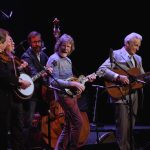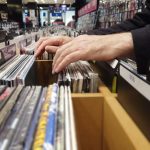My wife Annie sent me an interesting column, written by Kat Eschner for Smithsonian.com. It was about none other than the fantastic military marching music maker himself, John Philip Sousa. The inspiration of the Sousaphone (which everyone knows is the hybrid of a tuba and helicon — what the heck a helicon is, is anybody’s guess) and known by his nickname “The March King,” Sousa created fantastic military marches. Any lover of Monty Python has listened to his “Liberty Bell” march, which is stirring and able to make the most sedentary of humans stand up straight and start stepping.
In an essay titled “The Menace of Mechanical Music,” which he wrote for Appleton Magazine in 1906, Sousa laments this horrible new era, the era of recorded music. He sees that recorded music will take away the feeling of community, creativity and class. Anyone watching a DJ gyrate at a wedding can see that his prediction has, alas, come true. In the essay, Sousa states that mechanical music is “sweeping across the country with the speed of a transient fashion in slang or Panama hats, political war cries, or popular novels” and would form a “substitute for human skill, intelligence and soul.” In other words: “Beware the DJ.” He also was right about political war cries, but that is for another article.
In his essay, Sousa was railing in part about the lack of composer rights, an issue that dogs songwriters to this day. But in a larger sense, before television and the iPhone, Sousa laments the loss of the common man playing an instrument in community.
When the essay was written, in 1906, the phonograph was just starting to take off. Sousa was afraid that it would chip away at the unique “musical mecca” that America had become. He testified to Congress that “these talking machines are going to ruin the artistic development of music in this country. When I was a boy…in front of every house in the summer evenings, you would find young people together singing the songs of the day or old songs. Today you hear these infernal machines going night and day.”
When I was a boy, my great Uncle Frank reminisced about his youth in 1906 Dubuque, Iowa, when neighbors would do just that, gather at homes to play the piano and sing. Everyone learned the piano because it was a social instrument for entertainment and community. The creation of the phonograph and later devices did not stop music. But it did change community.
What Sousa felt was that the vital and vibrant part of our sense of “we” that centers around community participation would be laid waste by a profusion of technology, and a commercial lack of taste.
In an era when laws have to be created to fine people from texting while crossing the street, the danger of devices does lie in the elimination of community, of literally seeing our neighbor and being in the moment. Why talk to someone when I can text anyone? And why attend a concert when I can watch it on my phone? (Or worse, spend a concert so consumed with trying to capture it on our phones so we can share it to social media rather than actually experience communion with the artist giving their all on stage.) We are now distressed by what is happening halfway around the globe without knowing what is happening halfway down the block.
Sousa also lamented “the general assault on personality in music.” Just watch the CMA awards and you will see he wasn’t too far off the mark. Like devices that are mass produced, taste trends toward vanilla in an effort to accommodate the majority.
So what is the lesson to take away from this? As the holidays approach, get out to see live, original music. Start a house concert series in your home and foster community. Learn an instrument or put the smartphone in the drawer for an hour or two. Encourage your children and grandchildren to pick up an instrument with an eye toward mastering it.
I think Sousa would want us to shake things up, to break the spell that mechanical devices can give us, if we allow them to. Sure, I am grateful for technology and the fact that even ol’ John Philip Sousa was recorded leading his band for me to hear today.
But anyone who has joined Switchback in a cave concert, or jingled keys during a Christmas show, or looked over the hills of Ireland while Brian’s mandolin strums, understands that we are creatures of the moment.
Those moments cannot be recorded. One has to be there, be present and share that moment with others. And sharing those moments together is the ultimate culmination of being alive.
~ Martin McCormack
WayGoodMusic.com




